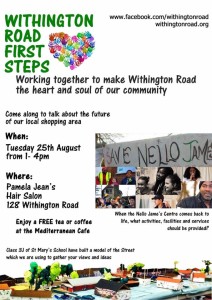As cities experience a demographic shift, the need for age-friendly design is becoming ever more critical. From almshouses to driverless cars, the future of urban housing and mobility may just be shaped for and by the elderly
(Guardian article – Alice Grahame, Monday 25th April)

An elderly woman in Stockport town centre. Photograph: Christopher Thomond for the Guardian
There is no denying it: like it or not we are all getting older. According to theUN World Population Prospects report, the global population of older people is growing at an unprecedented rate. By 2050, for the first time in human history, there will be more over-65s than children under 15. The number of people over 100 will increase by 1,000%. And as by then 70% of the world population will likely live in cites, this will present huge challenges, and cities will need to adapt.
Of course an ageing population is not inherently a bad thing: it reflects improved health and rising life expectancies. However, as we age, our housing, transport and social needs change. By preparing for this, policymakers, town planners and architects can make it more likely that older populations can still lead fulfilling lives.
The global engineering firm Arup has looked at how authorities are responding to this demographic shift. Stefano Recalcati, project leader behind the firm reportShaping Ageing Cities, explains that cities must adjust if older people are to maintain quality of life: “It important to be conscious of the ageing trend. It is a huge challenge for world cities – they will need to change, to make sure older people continue to play an active role in the community and dont become isolated. Isolation has a negative impact on health so tackling that is really important.â€
“Small innovations can make a difference,†Recalcati adds. “Older people are less likely to drive, favouring public transport and walking. The average person over 65 manages a walking speed of 3km/hour. At 80 that goes down to 2km/hour, compared with the average for a working age person of 4.8km/hour. Reducing the distance between transport stops, shops, benches, trees for shade, public toilets and improving pavements and allowing more time to cross the road all encourage older people to go out.â€
In the UK, the government has just announced the building of 10 new townsdesigned to address ageing and health issues such as obesity. As well as encouraging more active lifestyles, the designs could include wider pavements, few trip hazards and moving LCD signs, making the streets easier to navigate for people with dementia and other age-related conditions. London-based charityLiving Streets has also been working alongside communities carrying out street audits with older residents to see what improvements could be made, as well as campaigning at a strategic level to influence positive legislative and infrastructure changes. Their project Time to Cross campaigned to increase pedestrian crossing times which resulted in Transport for London (TfL) agreeing to a review.
Cities that have addressed accessibility are likely to be ahead of the game in age-friendliness. In recent years there have been efforts to make cities more accessible to both disabled and elderly residents and visitors. Berlin is aiming for 100% accessibility by 2020. The city authorities are working to widen pavements, bring in tactile guidance at road crossings and easier access to trams and buses. This year Milan won the European Commission Access City Award for its high standard of building design and access to transport.
What lessons can urban planners learn from looking at existing retirement communities? These are popular in the US and growing in other parts of the world: separate towns, often gated, for over-55s. Deane Simpson, an architect who teaches at the Royal Danish Academy of Arts in Copenhagen, recently spoke at an event organised by Museum of Architecture and The Building Centre in London about designing cities for an ageing population. In his book Young-Old: Urban Utopias of an Ageing Society, Simpson looks at communities likefor 55-75 year olds who are retired and in good health with money to spend. One scheme The Villages in Florida, a network of “village†developments housing 115,000 over-55s linked by a 90-mile network of car-free golf-cart roadways – and offers a life of restaurants, bars, cinemas and sports.
Simpson is critical of the way this type of lifestyle cuts people off from the rest of society, with age becoming a new form of segregation. However he accepts that they reflect a desire for an active, experience-filled lifestyle. Simpson admits that there are certain elements that could be applied to a multigenerational urban setting: “The golf cart infrastructure provides a transport network for vehicles slower than cars. This could be replicated as a way of integrating mobility scooters and electric wheelchairs and bicycles. In Denmark and the Netherlands where biking culture is strong, bike lanes are increasingly being used by mobility scooters. It is a way of enabling safe mobility for those not able to walk and not able to drive.â€
The US model of retirement communities is increasingly being exported. In China more than a quarter of the population will be over 65 by 2050. The elderly have traditionally been taken care of by the extended family – often with three generations living together. But demographic changes are severely challenging that family unit. The one child policy combined with longer life expectancy means that a typical married couple could be looking after four parents and up to eight grandparents.
There is a rise in assisted living schemes, like the US-designed Merrill Gardens in Shanghai and Harbin. Lead 8 is an architecture and design studio working in the region; their co-founder and director Simon Blore explains that they have worked on new developments in China that are 80-100% geared towards elderly groups. “We attempt to maintain the scale of a typical Chinese village; all needs are met within a short walking distance (the elderly in China do not have cars, and may no longer even use bicycles). Overlaid on this is a system of local health clinics, essential services, open spaces and leisure facilities, which is not so different from assisted living housing, but on a much larger scale.â€
Blore has reservations about whether US-style senior living will be widely accepted: “I think most people want to be part of regular society, part of the community, so that probably a challenge internationally – trying to get that balance right – a place with a high level of care and a sense of community and a relationship with the wider society.â€
Lead 8 is working on a Malaysian residential complex in Kelana Jaya, near Kuala Lumpur, that could offer a solution. “On each floor there are flats of different sizes next to each other, with a wall that can be taken down. An owner can buy two adjoining apartments – one large and one small. The family lives in the big one with grandparents next door, and they can either be separate or interconnect.â€
Integration rather than segregation is advocated by London architect Stephen Witherford. His firm, Witherford, Watson, Mann, will be building a complex of 57 flats for over-75s in Bermondsey, London. The project is based on the traditional almshouse model of charitable housing for pensioners, but updated for the 21stcentury. “Traditionally almshouses were set back behind a fence,†explains Witherford, “but we wanted to create a version that would tackle the problem of isolation. It will have a lounge that opens directly on to the high street.†There will be a cookery school, performance space, rooftop allotment and a workshop. Residents can hold craft fairs, cake sales and perform or watch plays. “The public can come in and get involved. Amenities are nearby and there is a bus stop outside for trips into town.â€
Rethinking traditional designs is also a priority for Susanne Clase, an architect with White Arkitekter, who is designing flats for seniors in Gothenburg, Sweden, and including potential residents and home-care professionals in the decision-making. She explains the flats are designed to accommodate regular visits from professional carers who help with personal tasks: “in our design the public and private spaces are reversed. The bedroom and bathroom are by the front door so the carer can access them. The living room and kitchen are at the back and are the resident private space.†Clase believes that designing with ageing in mind is good for everyone. “It important to help people live independently for as long as possible, and to design that in from the beginning rather than make adaptations later on. We already have a high level of accessibility in Sweden. You wont get a permit to build unless you can show that if the resident breaks a leg it wont be a problem. So we are already thinking ahead.â€
While Europe may be looking to the future, in Japan the future has already arrived. The country has the oldest population in the world: 33% is over 60, 25% over 65, and 12.5% over 75. “Japan is very aged so the government is prioritising making cites age-friendly,†says Setsuko Saya, head of regional policy at the OECD-led research into ageing in cities. Toyama, where 26% of residents are over 65, has adopted the principle of a compact city – which promotes high density, public transport, walking and cycling. The aim is to avoid the urban sprawl that can be so isolating for those with limited mobility. Despite being on a large area of flat land, which could be developed, the policy is not to expand outwards. A tram circles the city and investment is focused along the tramline and in the city centre, where there are public spaces for people to get together. People live in limited residential areas close to services and with good public transport – so they dont need to drive. Saya points out that it important not to characterise ageing as a problem, and to recognise that these strategies dont just help older people: “The tram connects people as well as transports them. It good for everyone.â€
While developing public transport is important, there will always be some unable to access it. A UK report by the International Longevity Centre found that despite transport being free for the over-65s, more than 30% of them dont use the service. In these cases, self-driving cars are put forward as a solution that could “liberate†older people, as a mobility service for those who can no longer drive and are not served by public transport. Google are even “targeting†their self-driving cars to retirees. The city of Suzu in northern Japan has already been trialling the use of self-driving cars to keep older people mobile.
But how will these innovations work in an age of austerity, reduced pensions, later retirement and rising housing costs? Age-friendly design can help us rethink our cities, but how can we make sure these innovations reach the majority of older people? Looking to the future, with millennials expected to be poorer than their baby-boomer parents, young people unable to get on the housing ladder today are unlikely to have equity in old age. Professor Christopher Phillipson of Manchester University believes more political will is needed to make sure age-friendly cities include those hit by austerity and industrial decline: “age friendly cities cost money but in the UK there is less money available for local authorities wanting to take action. There are considerable barriers – given pressures on budgets and limited commitment from policy-makers and developers. In the absence of these the possibility of creating age-friendly environments will be constrained.â€
In Manchester, the first UK city to be recognised as age-friendly by the World Health Organisation, the Manchester Institute for Collaborative Research on Ageing (Micra) has been training older people to research what makes an age-friendly city. They found that for most people it was human contact, rather than high-tech gizmos that were important – such as door-to-door community visits for people unable to use public transport. “Manchester is age-friendly because it has strong political leadership and the city supports neighbourhood groups, and works with community leaders,†continues Professor Phillipson. “The most important thing is collaboration across a broad range of interests, not least older people themselves.â€
Follow Guardian Cities on Twitter and Facebook and join the discussion
















